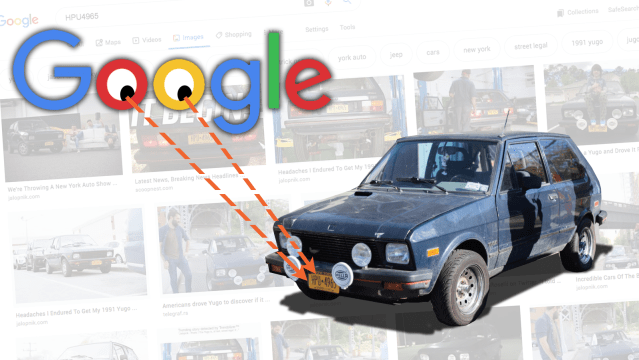For years I’ve gone back and forth over the practice of obscuring licence plates on photos on the internet. Licence plates are already publicly-viewable things, so what’s the point in obscuring them, right? Well, now I think there actually is a good reason to obscure your licence plates in photos because it appears that Google and Facebook are actually reading the plates in photos, and then making the actual licence plate alphanumeric sequence searchable. I tested it. It works.
Starting with Google, the way this works is to search for the licence plate number using Google Images. That’s it.
In my testing, I started with my own cars that I know have had images of their licence plates in their articles. For my Nissan Pao, a search of my licence plate number brings up an image of my car, from one of my articles, as the first result:
It’s worth noting that the image search results aren’t even trying to differentiate the search term as a licence plate; the number sequence has just been tagged to the photo automatically after whatever hidden Google OCR system reads the licence plate. This can mean that someone searching a similar sequence of characters could likely end up with a result for your car if enough of those characters match your licence plate.
I tried again with the licence number for the Yugo fellow Jalop Mike Ballaban gave me, and was greeted with an even more impressive display of results:
Woah, damn! Because this car has been photographed and written about a good bit, there’s a lot of results here, and my name and other employees’ names show up in those top links, too. Of course, I should mention that at no point did we tag the Yugo’s licence plate number to any of these photos — that’s all behind-the-scenes Google black magic.
The licence plate reader does not differentiate based on the national origin of plate — whatever that AI is doing, it seems to identify a car and a licence plate, and then reads the characters and tags the image with them. Here’s a European plate used on a Mercedes press car:
I also was able to learn that Volkswagen must be re-using plates on their press vehicles, because the VW California camper I just tested had a plate with the number HCA 187:
…and that same plate shows up on a red camper from the previous year:
Since it treats all countries equally, sometimes you can use it to find a car’s foreign licence plate-twin, as I did with this V8-swapped Karmann Ghia I spotted on the road, which has an unexpected Eastern Bloc licence plate-twin:
I obscured those plates because the Ghia didn’t show up online. Yet.
Back to company-owned press vehicles, here’s the Jeep Gladiator I took on the Rubicon Trail, by licence plate:
Now, many plates I searched for from other sources online didn’t come up, but many did. It’s safe to say that if there’s a photo of your car online and the licence plate is visible, it will be read and tagged to the photo.
I don’t think there’s really all that much you can do about it. There are some ways you can maintain a bit more privacy, though, if you don’t want your cars, like mine, to pop up immediately when their licence number is entered into a Google Image Search.
One way is to get an all-numeric licence plate. Because numbers show up in so many contexts, an all-numeric plate search will likely be diluted by other results, making your car harder — if not impossible — to find.
Counterintuitively, the same goes for personalised licence plates, too.
For example, I tried to search for this car’s plate, which was a personalised plate that used a normal, English word with a number replacing a letter. This alternate version of the word was common enough that a search was flooded with other, unrelated examples, making any possible images of this Viper very difficult to find.
Look, here’s a DKW from the Lane Museum, found via its licence plate.
Anecdotal reports have suggested that Facebook and Instagram do this as well, and we may as well go ahead and accept this as true. If Google is doing it, there’s little reason to assume others aren’t.
I just checked a test I did on Facebook earlier today to see if they’re reading and tagging licence plates, and, yep, it appears they are:
So, people can type your licence plate into Facebook and, if it’s visible in any of your photos, it seems like it’ll show up! Great for you budding stalkers out there!
The takeaway here is that you should just assume your licence plate is known and tagged to pictures of your car. Even if you obscure your plate in every image you yourself post, there’s no way to know what images your car and its licence plate may be in the background of, meaning if it’s not searchable yet, it likely will be.
I suppose the positive side is that if you see a hit and run or someone’s blocking you in, it’s a lot easier to find out who’s being the jerk. On the negative side, it’s just a reminder that privacy in so many ways is eroding away, and there’s damn little we can do about it.
Oh well. It’s not like I was being particularly sneaky in my Pao, anyway.
